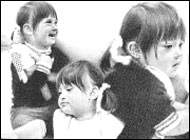California wildfires making children sick?
The wildfires that swept through Southern California in 2003 may have caused wheezing and other respiratory problems in many children, even those without asthma, according to a new study.
Asthmatic children, being particularly susceptible to the effects of the smoky air, suffered the most symptoms, the study found.
But non-asthmatic children were also struck by attacks of wheezing, coughing, sore throats, eye irritation and colds during the October 2003 wildfires that burned more than 1,000 square miles in Southern California.
They essentially experienced what many asthmatic children do on a normal day, the study authors report in the American Journal of Respiratory and Critical Care Medicine.
“The fire gave the non-asthmatics an idea of what it means to live with asthma,” Dr. Nino Kunzli, the study’s lead author, told Reuters Health.
The 2003 wildfires sent plumes of smoke into the air that hovered for days, raising levels of air-polluting particulate matter by 10 to 20 times. The smoke also contained carbon monoxide and numerous other toxic substances. Such poor air quality is particularly dangerous for people with asthma, whose symptoms can be exacerbated. 
To measure the impact of the wildfires on asthmatic and non-asthmatic children, Kunzli and his colleagues at the University of Southern California in Los Angeles surveyed 873 high school students and the parents of 5,551 children between 6 and 7 years old. All of the children lived in one of 16 communities affected by the fires.
The 706 children with asthma were two to three times more likely than non-asthmatic children to suffer wheezing, other respiratory symptoms, and eye symptoms. But children without the condition also had symptoms at a higher-than-normal rate on smoky days.
The study did find, however, that some protective measures health officials recommended at the time - such as avoiding outdoor activities and wearing a mask - seemed to lower the odds of respiratory problems. Children with asthma were more likely to follow this advice.
“It is clear that reduction of exposure to wildfire smoke reduces the health problems,” Kunzli said. If families can’t evacuate their homes in such situations, he noted, measures like using masks and staying inside might at least reduce any respiratory effects.
It’s not possible to tell from the current study whether this smoke exposure will have lasting effects on the children’s health. However, he added, given that even smokers’ lung health improves once they quit, there may be no long-term damage from the wildfire smoke.
SOURCE: American Journal of Respiratory and Critical Care Medicine, December 1, 2006.
Revision date: June 14, 2011
Last revised: by Janet A. Staessen, MD, PhD